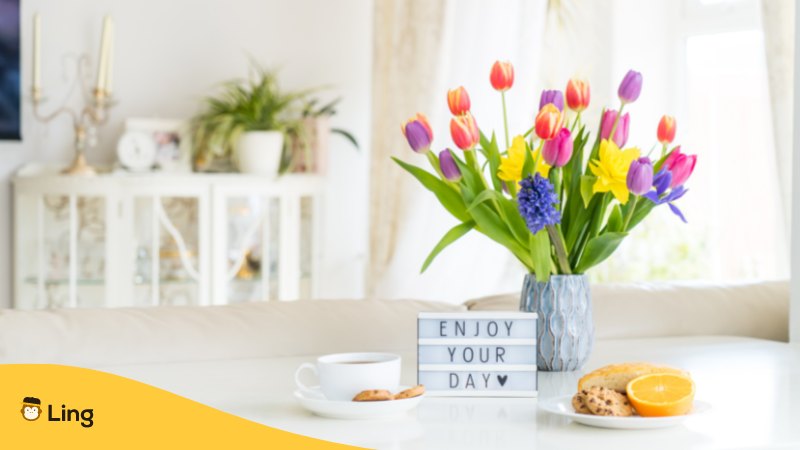Would you like to know how to say good morning in Portuguese? Fortunately, the Portuguese greetings are numerous and can be chosen based on the situation.
Therefore, learning a few ways to greet people at the beginning of the day can be an excellent way to impress others and start a friendly conversation with native Portuguese speakers.
Keep reading to learn the best Portuguese greetings and ways to say good morning.
What Are The Best Ways To Say Good Morning in Portuguese
Learning to say Good Morning in Portuguese is pretty easy. Fortunately, most words are easy to remember and pronounce. If you do not remember any variation, you can always say “Bom Dia” (Good Day), which can suit most social situations.
Here are some common phrases:
- “Bom dia” – Good morning ( literally translates into “good day”)
“Boa manhã” – Good morning (informal situations) - “Bom café da manhã” – Have a nice breakfast
- “Bom começo de dia” – Good start of the day
- “Boa tarde” – Good afternoon/good evening (in case you meet someone only later in the day)
- “Bom alvorecer” – Good dawn
- “Boa noite!” – Good night!
- “Boa primeira hora do dia” – Good first hour of the day
“Bom início” – Good beginning
“Bom começo da manhã” – Good start of the morning - “Bom dia, sol” – Good day, sun
Note that “Boa tarde” (Good afternoon) is usually used until around 6 pm.
“Bom alvorecer” is a phrase that can be translated as “good dawn” in English. It’s a way to greet people in the morning, usually when the sun is rising. It’s a way to express that the person wishes for a good start to the day, a new beginning, and a fresh start.
Using this expression in everyday life is not very common, but it shows a poetic and romantic spirit.
How Do You Respond To Bom Dia?
A common and polite way to respond to “Bom dia” (good day) in Portuguese is to say “Bom dia” (good day) back.
This shows that you are acknowledging and returning the greeting.
You can also respond by saying:
- “Bom dia, como vai?” – Good day, how are you? (which is a common way to ask about the well-being of the person that greeted you).
Another way to respond could be:
- “Obrigado, bom dia para você também” – Thank you, good day to you too. (This is a polite and grateful way of responding, showing that you appreciate the greeting).

How To Say Hello In Brazilian Portuguese
Portuguese and Brazilian Portuguese are both Romance languages that come from the same origin; they are both based on the Portuguese language spoken in Portugal. However, there are some differences between the two languages in terms of vocabulary and pronunciation.
One of the main differences between the two variations is the Portuguese pronunciation. Brazilian Portuguese has a more open accent, emphasizing certain vowels and a more melodic intonation.
Another difference is in vocabulary; Brazilian Portuguese has incorporated many words from indigenous and African languages and some words from other immigrant languages, whereas European Portuguese has kept a more conservative vocabulary.
Grammar and syntax also have some differences. Additionally, Brazilian Portuguese uses many contractions, like
- “de” + “o” = “do”
- “de” + “a” = “da”
- “em” + “o” = “no”
- “em” + “a” = “an”
In summary, while the two languages are very similar, there are some differences in pronunciation, vocabulary, grammar, and syntax. As a result, speakers of one may have some difficulty understanding speakers of the other if they are not familiar with the specific dialect.
Here are some ways to greet and say “hello” in Brazil:
- “Olá” – Hello
- “Oi” – Hi
- “E aí” – What’s up (Informal situations or close friends)
- “Ei” – Hey (Informal way to say hello)
- “Como vai?” – How are you?
- “Tudo bem?” – Everything good?
- “E aí, tudo certo?” – What’s up, everything good?
- “Como você está?” – How are you?
Note that the greetings can vary depending on the context, social status, and familiarity with the person you are talking to. For example, “Olá” and “Oi” are more formal, whereas “E aí” and “Ei” are more informal.
“Boa tarde” and “Boa noite” are also used as greetings depending on the time of the day.
What Is Considered Good Manners In The Portuguese Culture?
In Portuguese culture, good manners are considered to be an essential aspect of social interactions. Some of the good manners considered in Portuguese culture are:
- Greeting people with a smile and making eye contact, using formal or informal greetings depending on the context, social status, and familiarity with the person you are talking to.
- Saying “please” and “thank you” when requesting or receiving something from someone.
- Being punctual and arriving on time for appointments and meetings.
- Using formal titles when addressing people, especially when talking to older people or people in authority.
- Be polite and courteous when speaking to others, and avoid using rude or harsh language.
- Respecting other people’s personal space and avoiding standing too close or invading their space.
- Being attentive and showing interest when talking to others, making an effort to engage in the conversation.
- Using formal attire when attending formal events or ceremonies.
- Showing gratitude and giving compliments when appropriate.
Would you like to practice Portuguese and become fluent in this language?
Learn Portuguese Using Ling App
Now that you’ve learned to say good morning in Portuguese, it’s time to take it to the next level. If you want to improve your skills and learn Portuguese as soon as possible, you can use the Ling app!
There is a lot to know about Portuguese culture and language. The good news is that now you have a tool to guide you through each step of the way until you become fluent and experienced in speaking Portuguese.
If you wish to know more curiosities about Portugal and its language, read: How To Apologize In Portuguese and Common Portuguese Verbs.
Are you ready to try it out? Download the app for free on the Play Store and the Apple Store today!






























































